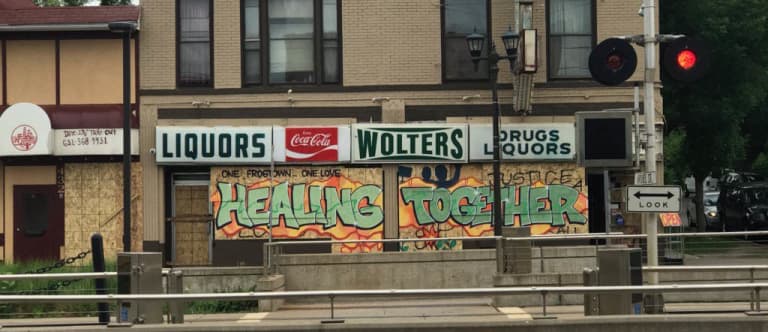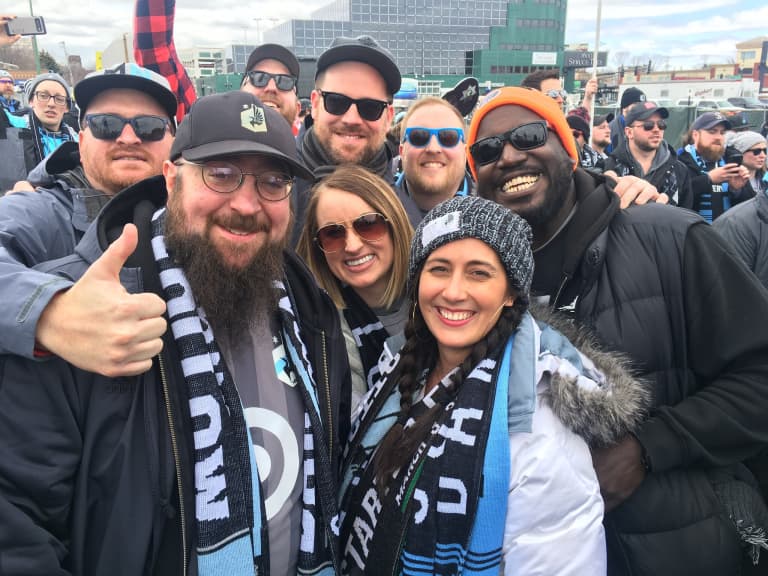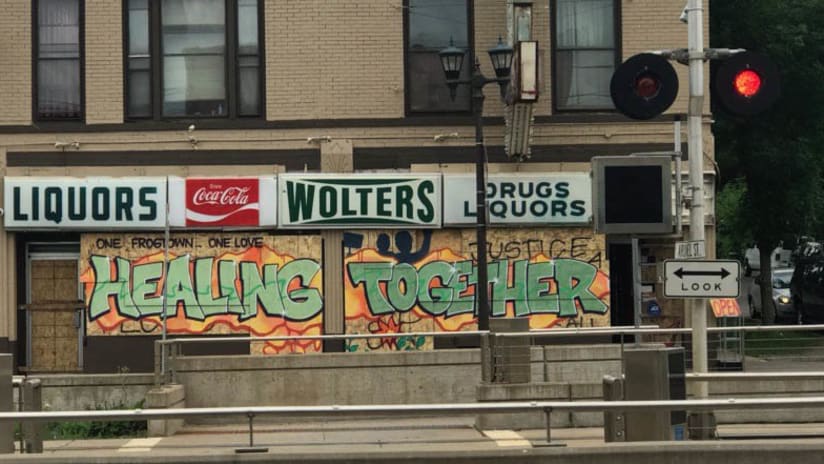Life has regained some semblance of normalcy for Abe Opoti and his neighbors after the pain, upheaval and stress unleashed by George Floyd’s murder and the resulting protests and riots last month.
“I don't know if you can call COVID normal, but it's returned much more to that kind of a rhythm,” explained Opoti, the president of Minnesota United’s Wonderwall supporters’ organization and a resident of Minneapolis’ Kingfield neighborhood, to MLSsoccer.com. “We aren't doing things like we were before, like sweeping the alley for incendiary devices hidden in the bushes and whatnot, and we don't have Blackhawks [military helicopters] flying low enough that it's rattling the windows on our place. We don't have cars racing around in the middle of the night.
“I sleep normally again, which is very nice instead of worrying about tear gas seeping in the windows. And it's now just fireworks instead of, ‘was that gunshots? Wait, no, that was flashbangs.’ Or, ‘that's what tear gas sounds like,’ things like that.”
It’s similar for fellow Loons supporter Rodrigo Sanchez-Chavarria and his family, who live in Frogtown, just east of MNUFC’s Allianz Field home in St. Paul.
“For the first week after the protests happened, I didn’t sleep," he said. "I stayed on my front porch til three or four o'clock in the morning, texting neighbors and other people, friends in my community, just kind of keeping a vigilant watch because we were mostly afraid of things happening, in a sense, from outsiders.”
"We as supporters can contribute in this fight against racism"

Residents of the Twin Cities have cleaned up much of the debris and commenced the rebuilding process after upwards of half a billion dollars of property damage was sustained over a week of unrest. It will take far longer to address the psychological trauma, fault lines and injustices exposed, many of which were decades in the making.
Minnesota United intend to take part in that process of healing, and so does the community that has grown up around the club and their vibrant supporters’ culture, the overwhelming majority of which proudly espouses principles of tolerance, equality, justice and diversity. And for Loons supporters of color like Opoti, the struggle – and the stakes – are particularly profound.
“Historic, tumultuous, revolutionary, stressful, these are some of the words that kind of come to mind,” said Eric Silva Brenneman, cohost of the MN Futbol Show and a member of the Dark Clouds supporters group since its early days, when the local pro team were called the Thunder and played at a high-school field in St. Paul.
“Yes, we as supporters can contribute in this fight against racism – and I mean, at this point, it's fascism, let's be totally honest – and injustice.”
Due to Minnesota’s long, cold winters and MLS’s coronavirus shutdown, MNUFC haven’t played a home game since last year’s MLS Cup Playoffs, depriving the fanbase of the unifying collective experience of a matchday. That hasn’t stopped the Loons’ kaleidoscope of supporters’ groups from making their presence felt, whether it be taking part in street protests, coordinating charitable initiatives or picking up the pieces after tempers boiled over and led to destruction.
“I live in one of the neighborhoods that got devastated, and the day after there were a lot of looting and fires here,” related Elisa Vicuña, another longtime Loons fan and a Midway resident. “Supporters showed up to the neighborhood [who] did not live there, to help clean up and take care of it. So there's definitely a showing from the supporters’ groups of like, ‘Hey, you guys matter, what's going on matters to us and we're not going to turn a blind eye.’”
Said Silva Brenneman: “I think it was the Saturday that first week we were out with brushes and brooms, cleaning up a lot of the glass and just getting the debris kind of centralized and organized. Because as you can probably imagine, it was a difficult, messy, messy situation.”
It’s striking that the Twin Cities, with their reputation for progressive ideals, became ground zero for the national conversation about racism and police brutality, and every MNUFC supporter of color who spoke with MLSsoccer.com had their own list of unsettling or dicey encounters with law enforcement in the upper Midwest over the years. All pointed to the lingering perception that people of color are perceived as outsiders in a once-lily-white region that has welcomed large numbers of immigrant and refugee populations in recent decades.
“I grew up in a real mixed community, immigrant community,” said Sanchez-Chavarria. “I have friends from Ethiopia, friends from different parts of the world. But we learned quickly as we got to be teenagers that every time something happened around the neighborhood, we were the first ones to be asked a question. Like, ‘did you do this, did you see this,’ and then there's always this interaction with the police.”
Said Opoti: “Any time you see someone wearing the uniform, or the red and blues flashing, you're wondering, which version of this interaction is it going to be? Is it going to be the cops who would drive by peaceful protesters spraying pepper spray at them when they weren't even in their way, when there was no warning given and there's no reason to do it? Or is it going to be one of the standard cops who are actually there to help, who won't escalate the situation?”
United in the way forward

Minnesota United supporters, including Elisa Vicuña and Abe Opoti (right) | Elisa Vicuña
Vicuña is of Chilean descent and grew up in neighboring South Dakota. She believes she experiences less profiling because of her lighter skin tone, at least in Minnesota, but still fields statements like ‘what are you doing in this neighborhood?’ and “your name sounds like you're not from around here” from police officers. With that tension in the background, the multicultural nature of soccer becomes something more than just a feel-good factor.
“Because [soccer] comes from such an international background, I feel like it is more of that melting pot that people want to paint America to be,” said Vicuña. “We have to come together, because we're all supporting the same thing and trying to push forward a sport that wasn't all that popular in the US 15 years ago, 20 years ago.
“I don't feel like an outsider as a Latina,” she said of MNUFC’s fandom. “You know what I mean? It doesn't feel like we're on the outside trying to look in, it very much feels like we're part of it.”
As an organization, United have hosted a free farmers market at Allianz Field, staged a benefit concert, launched a custom t-shirt design to raise funds for local charities, have donated to a Midway neighborhood relief fund and set up a resource center on their website to help fans, staff and players get involved.
The Loons front office has also provided space for Black players like Jacori Hayes and Ike Opara to speak out on the club’s media channels and amplified their personal social media posts. They helped the first team hold a demonstration of support for the Black Lives Matter movement at a recent training session and have held calls with players of color to solicit feedback about what the club can do better on these topics.
Their most devoted faithful recognize those efforts and they want the Loons to keep going further, even as they recognize that the club itself may face more hurdles to take part in activism than a member-led body like the Dark Clouds, Red Loons, Dark Glitterati and the many others in MNUFC’s orbit.
“The thing that I like about the supporters and the supporters’ sections and groups in this atmosphere is that they are progressive,” said Sanchez-Chavarria, “and they're willing to fight [for change].
“There's a lot of history in this neighborhood in this part of St. Paul, and having a team and a stadium put in the middle of it, I would hope that one of their focuses is to be able to not only do outreach, but also involve themselves into things that this community needs … a commitment to understanding not only the history of these neighborhoods but also engaging in change as well for them.”
He hopes MNUFC will help spread anti-racist messages to all levels of the local soccer scene, especially the youth and grassroots levels, and foster “deeper conversations” about the path toward a more just and equitable society. Silva Brenneman is among a group of supporters lobbying for, among other ideas, removing the national anthem from pregame ceremonies and ending MNUFC's security contract with St. Paul's police. He says that the supporters will stand in solidarity with players like Opara who are demanding change on a wider level.
Opoti said that the Wonderwall and its members are holding conversations with club officials about the way forward, and believes their healthy relationship to this point provides a solid foundation for everyone involved to step up.
“All of the SGs of the Wonderwall are behind it, and saying, 'we're going to continue to work on these things that have been holding people back.' Yes, that's absolutely a priority. And if it's not healing, it's at least showing that being a part of the community is more than just showing up, watching soccer, then leaving,” he said.
“All of the SGs believe in making a difference, believe in effecting change in the community,” he added. “Yeah, we're here for soccer, originally, but we're also here to show love to the community that's shown so much support to us.”













